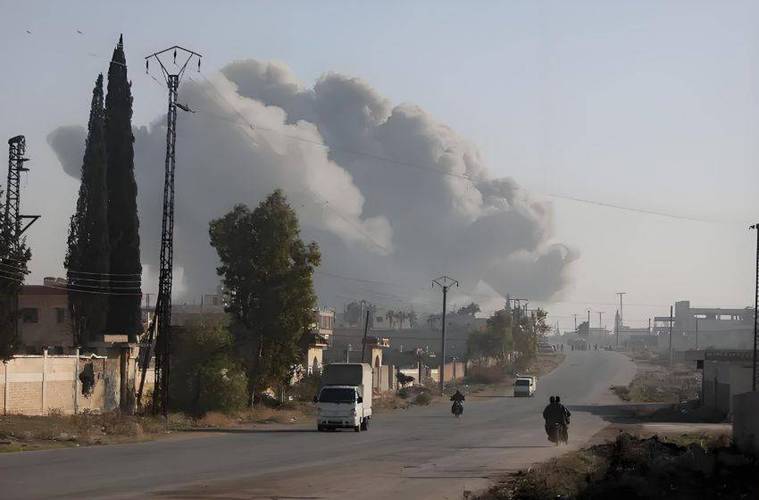
The fall of the Assad regime in Syria has aroused widespread concern around the world, which has had a multi-faceted impact on the global economic situation.
The first is volatility in energy markets. Despite a sharp drop in oil production since the 2011 civil war and no oil exports in recent years, Syria has geopolitical clout because of its location and ties to Russia and Iran. The fall of the Assad regime has raised geopolitical risks in the Middle East and investors have concerns about the stability of oil supply, driving oil prices higher, with Brent crude futures and West Texas Intermediate crude futures up 1.4% and 1.7% respectively on December 9. However, factors such as weak global oil supply and demand fundamentals and Saudi Arabia's cut in crude prices have limited oil price gains.
Second, regional trade and economic cooperation are hindered. Syria's neighboring countries, such as Turkey, Iran and Israel, have complicated interests in Syria, and the fall of the Assad regime has intensified the game among countries, which may affect regional trade and economic cooperation. For example, while Turkey may take the opportunity to expand its influence in Syria, it also needs to deal with changes in the labor market and consumer demand brought about by the return of Syrian refugees. Iran faces the dilemma of losing an important ally, and its economic cooperation and strategic channels with Syria may be affected.
The third is the impact on the global industrial chain. Syria's civil war has devastated the country's economy, damaged its infrastructure and made it difficult to rebuild after the fall of the Assad regime. This will affect the stability of the relevant industrial chain, such as Syria was once one of the important oil-producing countries in the Middle East, the stagnation of the oil industry has an impact on the global oil industry chain, in addition, the destruction of its agriculture, manufacturing and other industries has also affected the supply of global related products and the normal operation of the industrial chain.
In addition, there will be financial market volatility. The uncertainty caused by the fall of the regime has increased investor panic, and funds have flowed into safe-haven assets such as gold, which has pushed up the price of gold, and also led to volatility in the Middle East stock market, which has affected the stability of global financial markets. In addition, the risk assessment of the international financial institutions for Syria is likely to increase, affecting investment and lending to the region, and also having an indirect impact on financial flows in global financial markets.
This will have a dual impact on the Belt and Road Initiative. Syria is an important partner country in the "Belt and Road" Initiative. The fall of the Assad regime has made China-Syria cooperation projects face great challenges and uncertainties, such as the possible obstruction of China's infrastructure construction and energy cooperation projects in Syria. However, in the long run, the new regime will bring new opportunities for China to carry out economic cooperation in Syria and its surrounding regions in order to revive the economy or seek external cooperation more actively after coming to power.
Moreover, Syria's economic reconstruction needs a lot of financial and technical support, and the international community is likely to increase aid to Syria, which will change the pattern of the international aid market. At the same time, companies from various countries will also compete for a share of the Syrian reconstruction market, such as Turkey's construction industry has shown expectations for the Syrian reconstruction market, and the share price of related companies in its stock market has risen.
Overall, the impact of the fall of the Assad regime in Syria is complex and multifaceted, with knock-on effects across several key sectors of the global economy, including energy, trade, industrial chains, and finance. In the short term, heightened geopolitical risks, market volatility and obstructed cooperation will dominate, bringing many destabilizing factors and uncertainties to the world economy. In the long run, however, this change may also prompt all parties involved to seek new opportunities and balances in the crisis. Whether it is Syria's own reconstruction efforts and the reshaping of regional cooperation that may be driven by it, or countries' re-consideration and strategic adjustment of resource allocation and market share under the new geopolitical pattern, it will continue to affect the direction of the global economic situation for a long time to come, requiring the international community to respond to the challenges and opportunities brought by this major change with a more flexible and forward-looking attitude.

報告顯示,中國電力投資加速增長,預計2024年電網基建投資將超過5300億元。
近日,市場迎來了一則引人注目的消息:工業巨頭3M公司(MMM.N)在本周五公布了其季度業績報告,隨後股價飆升至近兩年來的
最近,外媒給OpenAI算了筆賬,今年可能要血虧50億美元。
近日,巴黎奧運會和世界鐵人三項協會聯合發布了一項重大決定,宣布因塞納河水質污染問題,原定於近期進行的奧運會鐵人三項首次下
當地時間7月18日,法國巴黎發生了一起令人震驚的持刀襲警事件。
近期,一則重大消息在國際舞臺上引起軒然大波,馬來西亞宣布加入金磚國家。
調查發現,互聯網和智能手機的使用幹擾了韓國近五分之一學生的生活。